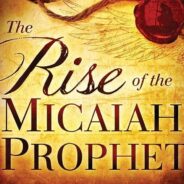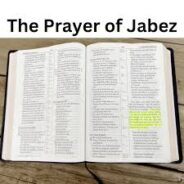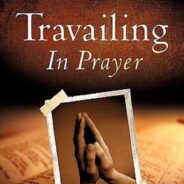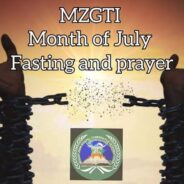Posted by Admin on 12:20 am in Sunday School | Comments Off on PROPHET MICAIAH, THE SERVANT OF GOD, August 13th, 2023

CENTRAL THOUGHTGod’s word will always prevail over falsehood. HYMN: When we walk with the Lord. TEXT: 1 KINGS 22:1-37INTRODUCTION:In the time of the reign of Ahab, the king of Israel, he requested the assistance of Jehosphaphat, the king of Judah to fight a war against the Syrians. Jehoshaphat suggested that before embarking on the war, they should first seek the will of God concerning the matter. The encounter of the two kings with prophet Micaiah will be examined in this study. LESSON OBJECTIVES: By the end of this study, the believer should be able to: Identify who prophet Micaiah was: State the message of the prophets: Explain the content of the true message declared by prophet Micaiah: Discuss how the prophecy of Micaiah was fulfilled: and Highlight the lessons derived from this study. BIBLE TRUTH:QUESTION 1.) WHO WAS PROPHET MICAIAH?1 KINGS 22:8, 14Micaiah was the son of Imlah, a prophet in the land of Israel during the period of the reign of Ahab as king. He was a prophet of the Lord.King Ahab hated prophet Micaiah because the king believed that Micaiah never prophesied good concerning him but evil. However, Micaiah always prophesied whatever God asked him to say. QUESTION 2A.) WHAT WAS THE MESSAGE OF THE PROPHETS? (1 KINGS 22:12; 20-23)The prophets (about 400 of them) prophesied in unison “saying, Go up to Ramon-gilead, and prosper: for the Lord shall deliver it into the King’s hand” (1 Kings 22:12). By the revelation God gave Micaiah, we understand that God put a lying spirit in the mouths of the prophets to prophesy a lie unto Ahab. God was not pleased with the King because of the fact that he had forsaken the God of Israel, the true God and was serving Baal and other idols. God permitted Ahab to be deceived by this false message so that he would fall at Ramoth-gilead. QUESTION 2B.) COMMENT ON THE ADVICE OF THE MESSENGER SENT TO CALL MICAIAH AND THE PROPHET’S REPLY. 1 KINGS 22:13-14The messenger sent to call Micaiah tried to persuade him to declare ‘good’ to the King just like the other prophets who declared “good unto the King with one mouth”. Using the exact words of the messenger to Micaiah sounds like this “let thy word I pray thee, be like the word of one of them, and speak that which is good”. The truth of the word of God cannot be thwarted or compromised. Whatever is determined by God cannot be changed. Prophet Micaiah replied the messenger thus “As the Lord liveth, what the Lord saith unto me, that which I speak” (1 Kings 22:14). A true prophet of God must be ready to deliver the message given to him by God exactly how he received it without adding to or subtracting from it. QUESTION 3.) EXPLAIN THE CONTENT OF THE TRUE MESSAGE DECLARED BY PROPHET MICAIAH. 1 KINGS 22:15, 17-23Initially, Prophet Micaiah spoke like the other prophets. However, Ahab was not convinced that Micaiah was telling the truth. Little wonder Ahab said to him “how many times shall I make you swear that you speak to me nothing but the truth in the name of the Lord?” (1 Kings 22:16). Then Prophet Micaiah declared the true message to King Ahab. Micaiah said that he saw all the...
read more
Posted by Admin on 11:06 am in Sunday School | Comments Off on A TRUSTWORTHY SERVANT: THE EXAMPLE OF ELIEZER, August 6th, 2023

CENTRAL THOUGHTA Trustworthy servant focuses all his attention on this master. HYMN: I am thine O’ Lord. TEXT: GEN.15:1-4; GEN.24:1-67. INTRODUCTION:The Bible uses several metaphors to describe the relationship of Christians to their God, and each of them examines it from a different perspective to reveal different truths. One of the most prolific metaphors is that God as Master and His people as servants.A servant is one who performs service for another. Servants are entrusted with tasks according to their capability, integrity, honesty, and trust. To be a trustworthy servant, that person must be one who is worthy of being relied upon. An example of a trustworthy servant in the Bible is Eliezer, the oldest servant of Abraham’s home whom he sent to Padan Aram to take a wife for his son Isaac. In this study we shall examine the life of Eliezer and draw valuable lessons. LESSON OBJECTIVES:At the end of the lesson, we should be able to: Describe the person of Eliezer. Explain what it means to be a trustworthy servant. See the steps Eliezer took to ensure that he obeyed his master’s instruction. Draw lesson from the life of Eliezer; and Highlight the qualities of a trustworthy servant. BIBLE TRUTH: QUESTION 1A.) WHO WAS ELIEZER? GEN.15:2-3; GEN.24:2Eliezer whose name means “my God is help” was the eldest servant of Abraham (Abraham had 318 trained servants in his household. Gen.14:14). He hails from Damascus and was Abraham’s most trusted servant whom he sent to get a wife (Rebekah) for his son Isaac. He obtained Rebekah as a bride for Isaac. QUESTION 1B.) WHAT DOES IT MEAN TO BE A TRUSTWORTHY SERVANT?A trustworthy servant can be defined as one who is reliable, loyal, faithful, and dependable. A trustworthy servant can also be defined as anyone who discharges his/her duties with little or no supervision and makes most use of available resources. Trustworthy servants are respectful, humble, and obedient. They diligently listen to instructions and obey them. QUESTION 2.) WHAT MADE ABRAHAM TO TRUST ELIEZER? GEN.24:2-9.Eliezer had faithfully ruled over all that Abraham had, so he was tested and found trustworthy. He was very respectful addressing Abraham and Isaac as “my master”. Hence Abraham committed into his hands the matter of seeking a wife for his son Isaac. QUESTION 3.) WHAT STEPS DID ELIEZER TAKE TO ENSURE THAT HE OBEYED HIS MASTER’S INSTRUCTIONS?GEN.24:9-14 He promised to obey Abraham by swearing; Abraham asked him to put his hands under his thigh to accomplish the given task. Putting his hands under the thigh of his master as a seal of solemn oath to his concerning this matter, he promised to get a wife for his son Isaac. As a good servant, he thought through the assignment and wanted to clear every doubt about it. Therefore, he asked reasonable questions to which the master gave adequate answers which now put his mind at rest. He made adequate preparation for the journey, and in faith set out taking with him ten camels loaded with jewelries, garments, and other gifts. He subjected his plans to the God of his master whom he had come to know. After travelling many miles to the city of Nahor, the servant bowed before God in prayer, requesting for guidance.Abraham’s servant acknowledged his own weakness and sought divine guidance...
read more
Posted by Admin on 8:52 pm in Sunday School | Comments Off on PERSONAL DEVOTION, July 30th, 2023

CENTRAL THOUGHTDaily intimate fellowship with God is an assurance against defeat and failure. HYMN: Holy, Holy, Holy! Lord God Almighty! TEXT: EXODUS 33:8-23; ISAIAH 6:1-12; DANIEL 6:4-23. INTRODUCTION:Every believer has a personal relationship with the Lord Jesus Christ, the Holy Spirit and the Father. This personal relationship comes into effect at the new birth and is nurtured and developed through a sustained and effective personal devotional life-style.Personal devotion is one of the Christian’s exercises that are so beneficial and needed but rarely practiced by many believers. Most of us are so pre-occupied with our struggle for survival in these hard days that we hardly include in our daily routines a time to be with God alone. But if we are to grow spiritually we must devote time each day where we must be alone with Him. We do this by reading, studying, and meditating on His word and spending also some reasonable time in prayers.When we do this on a daily basis, we find that we will never be barren or unfruitful but live daily a victorious Christian life. Let us be quick to mention at this point that developing an effective personal devotional life-style requires much dedication and commitment. There are a number of distractions within and outside us that will want to frustrate an individual who plans to practice a regular quite time. Hence, we must persevere to ensure that no day passes without us spending time with God preferably in the quietness of our home. LESSON OBJECTIVES: To know what is personal devotion. To know the importance of personal devotion in the life of a believer. To know what constitutes a personal devotion. To know how you can improve your personal devotion. To know the results of an effective personal devotional life-style. BIBLE TRUTH: QUESTION 1.) WHAT IS PERSONAL DEVOTION?Personal devotion is setting oneself apart in order to have a personal fellowship with God. This can be best achieved when we set a time each day to read, study and meditate on the word of God. It is also a time we set aside to pour our hearts to the Lord in worship, praise and prayers. It is a time we set apart to seek the Lord by ourselves. It is essential that every believer observe a quiet time each day for personal devotion. The time set aside should be at that person’s convenience; it could be day or night. It may not be fixed for a particular time of day or night, as some of our daily chores may not make this very convenient. However, one will counsel that where possible this should be a particular time each day.Personal devotion was a way of life for the men and people of God of old. These men of God who had a mark on the sands of time not only believed in but practiced personal devotion on daily basis. Thus, they were able to say thus said the Lord with all assurance and certainty. Moses often will leave the people and go into the tabernacle to have a ‘table conference’ with the Lord. One of such occasions he was privileged to see the glory and the back parts of God, (Exo.33:8-23). On two occasions he spent 40 days alone with God where he received the Ten...
read more
Posted by Admin on 8:36 pm in Sunday School | Comments Off on THE PRAYER OF JABEZ, July 23rd, 2023

CENTRAL THOUGHTGod will not overlook a sincere and passionate prayer. HYMN: What a friend we have in Jesus. TEXT: 1 Chronicles 4:9-10. INTRODUCTION:The book of Chronicles begins with the genealogies of Israel but chapter four reveals Judah’s descendants. (1 Chronicles 4:1-8). The most remarkable person mentioned is Jabez. He was called Jabez because he bore him in sorrow. Jabez’s, short appearance in the Bible may make us think that he was insignificant to warrant our attention, but a critical look at how he got his name and his prayer request will reveal that we have a lot to learn from him. He is remembered for his prayer instead of a heroic act. His prayer is worth reflecting on, though not to be used as a formula or mantra to be chanted. This study examines Jabez prayer and is aimed at encouraging us to pray, no matter our condition. LESSON OBJECTIVES:The objectives of this lesson are to: Identify who Jabez was and the meaning of his name; Appreciate derivable lessons from the prayer of Jabez; Understand why Jabez prayed; and Recognize that God answers sincere and passionate prayers. BIBLE TRUTHQUESTION 1.) WHO WAS JABEZ AND WHY WAS HE NAMED JABEZ? (1 CHRON.4:9)Jabez was a well-respected man and an ancestor in the lineage of the Kings tribe of Judah. He was a descendant of Judah. His parents names were not mentioned neither when we were we given the age in which he lived. But the Scripture mentioned that he was more honorable than his brethren. The name Jabez was also mentioned in 1 Chronicles 2:55 possibly as a place named after him.The name Jabez is Hebrew word for “atsah” which means “sorrow” or “pain”. His mother stated “I gave birth to him in sorrow” ( 1 Chron.4:9). To the mother, such could be a reminder of God’s faithfulness even in times of sorrow. And also a reminder to the child on the need to love, honor and comfort the mother in view of what she passed through the process of delivery. QUESTION 2.) WHY DID JABEZ PRAY AND WHAT DOES THE PRAYER REQUEST REVEAL ABOUT THE PERSON OF JABEZ ?Obviously, Jabez was not satisfied with his condition. The beginning of his life may have been very rough and he desired a change. He must have realized that he could not help himself, hence he decided to cry out to God for divine help. His prayer revealed that He had a personal relationship with the God of Israel, had faith in Him and was convinced that only this God could help him. He prayerfully trusted God to direct his life, for all round blessings, including material blessings, protection, and guidance. God honored him. His prayer also revealed that he was a man that desired to serve and bring glory to God. QUESTION 3.) EXPLAIN THE MEANING AND THE LESSONS DERIVABLE FROM THE PRAYER REQUEST OF JABEZ ( 1 CHRON.4:10)The prayer request of Jabez could be separated into the following four parts.a. “AND JABEZ CALLED ON THE GOD OF ISRAEL, SAYING, OH THAT THOU WOULDEST BLESS ME INDEED”.Jabez called on the God of Israel, the only living and true God. The covenant keeping God who hears and answers prayers; not on the dead gods of the gentiles. He appears to understand the blessedness...
read more
Posted by Admin on 9:39 pm in Sunday School | Comments Off on TRAVAILING IN PRAYER II, July 16th 2023

CENTRAL THOUGHTBelievers should pray always and not lose hope. HYMN: Spirit divine attends our prayers. TEXT: MATT 26:36-46, 1 THES.5:17, HAB.2:3 INTRODUCTION: Prayer is a very important aspect of Christian living. Jesus demonstrated this throughout His earthly ministry, thus leaving us an example to follow. In the garden of Gethsemane, he prayed so earnestly that His sweat was like great drops of blood falling to the ground Luke 22:44.In this lesson we will be looking at some areas in which we require travailing prayer in our warfare with the devil. LESSON OBJECTIVES: To identify areas in which we need travailing prayer. To identify also some situations in life when it appears as if answers to a Christian prayer is delayed and encouragement to give in such situation. To discover some of the things that will help in our prayers. BIBLE TRUTHQUESTION 1.) DISCUSS SOME CIRCUMSTANCES THAT DEMAND TRAVAILING PRAYER.The following are some of the areas we need to travail in prayers. a. THOUGHT (PRO. 4:23, 2 COR.10:5).Believers should not forget that the main battle field where the devil fights us most is our mind. He inspires evil thoughts, confusion, doubts, fear, despair, discouragement etc. A child of God should not allow his heart to be where devil operates anything he likes. Our hearts should always be guided in prayers to ward off any intrusion. b. ANXIETY: PHIL.4:6, MATT.6:25-34.Anxiety means worry. Most often the devil uses this as strategy to wear a believer out, presenting the catalog of needs of life all the time-what to eat, what to drink, wear, bills to pay, etc. all in attempt to make a child of God violate the word of God which says in Matt.6:25-34, “Take no thought for your life, what ye shall eat….”The believer should resist steadfastly the spirit of cares of this life in his prayers.Matt.6:34 says “take no thought for tomorrow,” vs, 32B…. for your heavenly Father knoweth that ye have need of all these things.” Be vigilant and trust God for your daily provision.c. TRIALS AND TEMPTATION:PS.34:19, 1 COR.10:13, MATT.26:41.The time of trials and temptation is not the time to abandon prayers, neither is it the time to give in or surrender to Satan. The devil is never a friend; he wants to lure a believer to sin, thereby making him to deviate from God and His word. Remember that he is always eager to get his threefold mission fulfilled (to steal, to kill and to destroy. Jn.10:10).The Bible says in 1 Pet.5:8-9, be sober, be vigilant, because your adversary the devil as a roaring lion…The believers should in times like this resist the enemy through travailing prayers. d. THREATS BY THE ENEMY AND HIS AGENT: MK.16:17, PHIL.2:10, ACTS 4:29 -30, DAN.6:10The devil can threaten a child of God in different ways; threats of death, accidents, termination of appointment, divorce etc. The believer should not at this time allow himself of herself be swallowed up in fear. Remember whom you are (son of God, joint heir with Christ etc.), power and authority have been bestowed on you by God.The word of God in Lk 10:19 says “ behold I give you power to tread upon serpents and scorpion…So do not be intimidated by any threat from any angle. Pray authoritatively, believing in your prayers all the time and...
read more
Posted by Admin on 9:37 pm in Sunday School | Comments Off on Travailing in Prayers (1), July 9TH ,2023

CENTRAL THOUGHTA prayerful Christian is a powerful Christian. HYMN: What a friend we have in Jesus. INTRODUCTION:There are some situations as we run the Christian race when answers to our prayers appear to be delayed or not forth coming. The reasons for this may not be immediately known by the believer. Under such situations some Christians become discouraged and may even abandon praying. But this is the time he/she should persevere in prayer and not to faint.A believer should realize that the battle with our arch enemy is not yet over. The devil uses situations like these to wear a believer out and make him or her to lose hope in God’s word and His unfailing promises.Travailing in prayer calls for perseverance and persistence in prayers until something happens. Daniel travailed in prayer seemed delayed (Dan.10:2, 3, 11-13). Jesus travailed in prayer leaving us an example (Lk 22:40-46). In this study we shall be looking at those ingredients that will help us to get back on our knees in prayer. Lesson Objectives: To understand the meaning of prayer and Travailing prayer. To appreciate the place of travailing in prayer. To highlight the derivable challenges in Christ prayer in the garden. BIBLE TRUTH:QUESTION 1.) WHAT DO YOU UNDERSTAND BY PRAYER AND TRAVAILING IN PRAYER?John 17:1-5, Acts 4:24, Matt. 26:39-42. Prayer simply means to express one’s desires, to commune with, to intercede, to ask earnestly and reverently, to make request from a higher power or authority. In our context the higher power or authority is God the Creator of the universe.God is the one who takes the initiative in communications between Himself and His creatures. He offers us the invitation to commune with Him in prayers ( Jer.29:12). The basic nature of prayer is a response to God’s initiative. Prayer is very important in the life of any Christian, as the individual cannot live a successful Christian life without it. The patriarchs, prophets of Old and many others including the Lord Jesus Himself, always prayed to gain victory and have their needs met by effective communication with God. (Gen. 18:22-23; Ex.15:24-25, 1 Sam. 1:15-16, Luke 18:1, James 5:17).Travail means strenuous mental or physical exertion while travailing in prayer means exerting a lot of energy in prayers or praying tenaciously in requesting something from God. QUESTION 2A.) WHERE DO WE TRAVAIL IN PRAYER?DAN.6:10, MATT.6:6, ACTS 12:5Travailing in prayer is always successful in one’s closet. That is a place where there is no distraction.Daniel when he knew that the writing was signed, went into his house, knelt down and prayed. Jesus our Savior commanded that we go to our closet to pray and the church also prayed; the garden of Gethsemane was the closet the Lord chose before facing the sufferings and death at Calvary.Although general prayers can be said anywhere, once a believer wants to make success in his/her prayer life, he/she has to get separated. QUESTION 2B.) IN WHAT LANGUAGE DO WE TRAVAIL IN PRAYER?Travailing in prayer can be made in any language. The Almighty God who is being communicated hears and understands all languages because He created them. Whether it be Greek, Latin, English, etc; He understands them; and each one of us should travail in his own smoothest language to God. Praying in the Holy Ghost is the highest...
read more
Posted by Admin on 1:18 am in Slider | Comments Off on Mount Zion Gospel Tabernacle International

Invites you to join us as we begin our annual month of July Prayer and Fasting. July 1st-31st, fasting from 6am-6pm (or as directed by the Holy Spirit). This year’s theme is taken from Isaiah 58:6. “Is not this the fast that I have chosen? to loose the bands of wickedness, to undo the heavy burdens, and to let the oppressed go free, and that ye break every yoke?” “For we wrestle not against flesh and blood, but against principalities, against powers, against the rulers of the darkness of this world, against spiritual wickedness in high places”, Ephesians 6:12. Scripture tells us that the battles that we face are not physical battles but spiritual ones. This year’s theme tackles those inherited yokes that have been passed down from generation to generation as well as the yokes we put on ourselves by engaging in iniquity. God’s word has told us that there are bands of wickedness that need to be loosed, burdens that must be undone, oppressive forces that we must be freed from as well as yokes that must be broken. Join us as we set apart the month of July to address these demonic forces to let God’s people go! MZGTI Month of July Fasting and Praying, fasting under the guidance of the Holy Spirit. Visit our facebook page for daily prayer points etc. https://www.facebook.com/Mzgtiglobal Elderly, pregnant women, and those with certain medical conditions should apply their hearts unto wisdom. Fasting with wisdom under the guidance of the Holy Spirit. For those who would like to join us in our prayers our prayer line will be open every night in the month of July at midnight:7164271426 conference code 568693# God bless you...
read more
Posted by Admin on 8:55 pm in Sunday School | Comments Off on FASTING: THE RIGHT WAY, July 2nd, 2023

CENTRAL THOUGHTFasting should be done the way it is prescribed in Scriptures. HYMN: Nearer, my God, to Thee. TEXT: MATTHEW 6:16-18, ISAIAH 58 INTRODUCTION:Fasting is a time when we humble ourselves before the Lord, accompanied with prayers and study of the Word. Fasting, is a means given to believers to approach the Lord, is practiced by many denominations. However, the purpose and its usefulness have been abused by a lot of individuals intentionally and unintentionally. For instance, its effectiveness is sometimes seen by some persons in the number of days one can fast or should fast, in order to receive from the Lord. Some believers pride themselves in the number of days they and their church members have fasted. Thus, it becomes a show. Some persons tacitly believe that fasting is a must as we enter into the new year or else that year will be less glorious. Sometimes some believers fast because their church or denomination has proclaimed a fast and not because they believe that it is the will of God for them to fast. Others think it is a sure way of receiving from the Lord irrespective of the way they live. Such persons do not see anything wrong with fasting in strife, unforgiveness, immorality, corruption etc. This study is to remind us that our fasting must be done according to the pattern prescribed in Scripture. LESSON OBJECTIVESThe objectives of this lesson include to: Make us understand that Fasting is a necessity. Know the proper way to fast Appreciate the reasons why we fast and Know what to expect when we fast. BIBLE TRUTH QUESTION 1.) IS FASTING NECESSARY FOR BELIEVERS? MATT 6:16-18; LUKE 5:35From the above Scripture (Matt 6:16-18) the Lord Jesus used the Word “when” which indicates that HE expects us to fast. To make the point more obvious, the Lord Jesus was specific about it when He said “but you, when you fast”. Also in Luke 5:35, the Lord Jesus boldly declared that “ the days will come when the bridegroom will be taken away from them; then they (His disciples; His body- the church) will fast in those days.” This is to affirm the truth that the Lord Jesus expects us to fast. QUESTION 2.) FROM OUR MAIN TEXT, WHAT ARE THE PROPER WAYS TO FAST?The proper ways to fast as recommended by God Himself in the Scriptures include:Fasting is expected to be between the person fasting, other parties that may be involved and God alone (Matt 6:17-18). It may therefore involve you and the church (Acts 13:1-2), your spouse and/or family members (1 Cor.7:5), and prayergroup members. It is not what we should broadcast or make a public show of or make boast of. Fasting is a time when we humble ourselves before the Lord. One of the reasons God didn’t respond favorably to the fast of the children of Israel was that they behaved as they pleased and not toplease the Lord. During fasting they quarreled, they fought and were in bitterness, strife and unforgiving ( Isaiah 58:3-4). It is also not a time for sensual pleasures. The Bible says that we cannot fast like this and expect our voice to be heard. Rather its’s a time where men humble themselves before the Lord.Fasting is the time of forgiveness- when...
read more
Posted by Admin on 10:15 pm in Sunday School | Comments Off on THE USE OF THE TONGUE, June 25th, 2023

CENTRAL THOUGHTWholesome use of the tongue is a measure of spiritual maturity. TEXT: JAMES 3:1-13; PSALM 34:12-13 INTRODUCTIONThe tongue is a very important part of the body, situated in the mouth. It is a very small fleshy muscular organ that facilitates speech among other things. When properly used, it brings blessings to the speaker and the hearer but when used wrongly, it can result in death, destruction, bitter envying and strife, clamor, and wars, etc.However, it is important to note that what comes out of a man depends on what he harbors in his heart because the Bible says, “out of the abundance of the heart the mouth speaks”, Luke 6:45. If the heart of an individual is filled with the word of God, the Holy spirit will undue him with godly wisdom that will enable him to control his tongue and “speak with grace”; have “sound speech that cannot be condemned”, Colossians 4:6; Titus 2:8. “For in many things we offend all. If any man offend not in word, the same is a perfect man, and able also to bridle the whole body.”, James 3:2. Wrong use of the tongue can cause a lot of problems to an individual in the home, neighborhood, and community and even in a local church.The Bible says: “Death and life are in the power of the tongue: and they that love it shall eat the fruit thereof”, Proverbs 18:21. For this reason, every believer is encouraged to make wholesome use of the tongue so as to have graceful speech seasoned with salt, Colossians 4:6; in order to avoid bitterness, clamor and in-fighting in a local church, James 4:1:2; Ephesians 4:31. LESSON OBJECTIVESThe objectives of this study are: To know what the tongue is. To appreciate what the Bible teaches concerning the use of the tongue. To know how to exercise control over the tongue. To know the consequences of wrong use of the tongue. To appreciate the benefits of proper use of the tongue. BIBLE TRUTH QUESTION 1.) WHAT IS THE TONGUE?The tongue is that fleshy muscular organ in the mouth that can be used for tasting, licking, swallowing and speaking. Although the tongue is a small member of the body, it can cause an enormous irreparable damage. If not properly used, it is full of wickedness, which can poison every other member of the body.In James 3:5-6, the Holy Bible describes the tongue as a little member of the body, which makes great boasts. It is also described as “a fire”, “a world of iniquity” that can defile the whole body, and set on fire the course of nature and “it is set on fire of hell”, James 3:6. This implies that though the tongue is a little member of the body, it can destroy the life of an individual, cause bitterness among brethren, wars and fighting among nations, or even cause confusion and strife in a local church if not carefully guarded.However, the tongue can only say what is in the heart. It mirrors the heart. When the heart is richly endowed with the word of God and Spirit-filled, the wisdom from above will help the believer to tame his or her tongue and have “sound speech that cannot be condemned.” Every believer is therefore encouraged to fill his or...
read more
Posted by Admin on 9:20 pm in Sunday School | Comments Off on ISAAC THE COVENANT CHILD, June 11th, 2023

CENTRAL THOUGHTGod keeps His covenant with His people. TEXT: GENESIS 22:1-18, 25:19-21, 26:1-6 Isaac was the son of Abraham and Sarah. He was born when his father was one hundred years old and the mother ninety years. He was a covenant child which God promised Abraham. Ishmael had already been born to Abraham at this time and he was almost giving up hope, thinking that it was no longer possible for him and his wife Sara to have children. Abraham was pleading with God on behalf of Ishmael, Genesis 17:15-18. ” And God said unto Abraham, Thou shalt keep my covenant therefore, thou, and thy seed after thee in their generations.”, Genesis 17:9. God is the covenant keeping God, “what He had promised, He was able also to perform, Romans 4:21b. We can be rest assured that God is too faithful to fail. Whatever promise He makes to us as His children, He will surely bring to pass. He is not a man that He should lie, neither the son of man that He will repent. His word is Yea and Amen.In this study, we shall discuss the birth of Isaac, his growth and progress in life from childhood to adulthood. We shall also highlight some lessons we can learn from the story of his life to see how we can apply them to our lives. LESSON OBJECTIVESThe objectives of this lesson are to: To discuss how Isaac’s birth marked the beginning of the fulfillment of God’s covenant with Abraham Highlight the lessons we can learn from the Scriptures concerning Isaac as a child. Examine how Isaac handled the barrenness of his wife and the lessons we can derive from it. Identify the secret of Isaac’s prosperity and the lessons that can be derived from it. To identify some shortcomings in the life of Isaac as recorded in the Scriptures that we must avoid. BIBLE TRUTH QUESTION 1. DISCUSS HOW ISAAC’S BIRTH MARKED THE BEGINNING OF THE FULFILMENT OF GOD’S COVENANT WITH ABRAHAM? GENESIS 18:9-15, 21:1-7, 17:9-27; ACTS 3:13, 24-25; ROMANS 9:6-10Isaac was the son of Abraham, who was born to him by Sarah his wife when Abraham was one hundred years old and Sarah ninety years. The birth of Isaac was the fulfilment of God’s promise to Abraham. “…I will certainly return unto thee according to the time of life; and, lo, Sarah thy wife shall have a son”, Genesis 18:10. Therefore, Isaac was a child of promise. God had promised Abraham that Sarah his wife was going to give birth to a son and that the child should be named Isaac which means laughter. God also told Abraham that He would establish a covenant with Isaac for an everlasting covenant. Although God entered into this covenant with Abraham a long time before the period of the birth of Isaac, the covenant found its fulfilment at the birth of Isaac, Genesis 15:18. God’s word will surely come to pass: no matter how long it takes, it will never fail. QUESTION 2. READ GENESIS 22:6-10 AND HIGHLIGHT THE LESSONS WE CAN LEARN FROM ISAAC AS A CHILD.There are many lessons we can learn from Isaac as a child. It was very obvious that Isaac knew and believed in the God of his father. His father must have taught him...
read more









